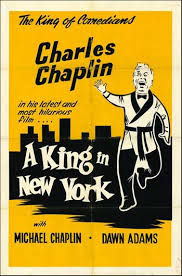
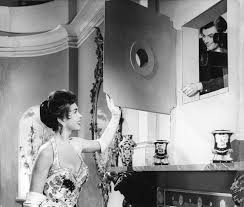
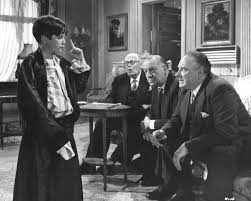
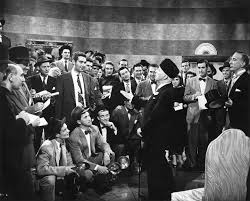
“There are many things absurd these days...”
A King in New York is one of Charlie Chaplin’s films that attest to his genius. Many filmmakers who want to make something meaningful that has happened to them in their lives more than likely will make a politically, emotionally charged film that can get out of hand and become annoying as they try their very hardest to gain sympathy and push their beliefs on the audience. What makes Chaplin a genius in this film is that he shows how absurd McCarthyism was and America’s Communist witch hunt and even though he was a victim of this ridiculousness he handles it with great care he moves our sympathy not to him but to a little boy and his family.
King Shahdov (Chaplin) was a ruler of some European country. After the war there was a revolution and he was forced to flee to America. He is apparently a genius with his plans for nuclear energy to run his countrymen’s homes. If he can get it passed by an international nuclear committee he will become famous for his invention.
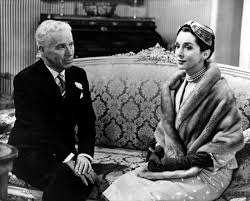
Shahdov refuses to speak about his country’s revolution and what he has done with his money. He will not give any interviews as well. A friend that he knows living in New York keeps insisting that he come to a party she is throwing at her apartment but Shahdov does not want to go. That all changes when he meets a young woman named Ann Kay (Dawn Addams), a television specialist, and she says that she is going to the woman’s party. Ann has manipulated the king in so many ways to go to the party. She desperately wants to get an interview with him and show him to the American people that she secretly has him tapped while sitting down to dinner with the other guests.
The tapping is aired live and Shahdov has become an overnight hit. The next day Shahdov is inundated with calls and messages wanting him to be the new advertising face of their company. He is reluctant at first but finally gives in when he and his butler begin to run out of money.
One day he visits a young boys’ school where he meets Rupert Macabee (Michael Chaplin) who is a political history buff. The former king and the young boy have an all out argument on politics. Shahdov can barely get a word in with Rupert so charged in his excellently backed argument. Shahdov really likes the boy and he gives back in a great way when Rupert has left school because his parents have been arrested for being Communists. A few days later Shahdov sees the boy walking on the streets and takes him in and cares for him by giving him warm clothes and even going out to get him a coat and some new clothes.
Unfortunately while the king is out the atomic committee comes to speak about his nuclear energy plans. Rupert tells the committee that Shahdov is his uncle so they do not ask too many questions as to why he is there. In his pretend family story he gets all charged up on his political history and he lets slip that he is a Communist. The committee men are outraged they do not want to deal with Shahdov if he is a Communist.
Soon Shahdov is falsely accused of being a Communist and is brought up in court. But he is let go after there is not enough evidence against him.
There are so many moving and touching and funny scenes throughout the whole film. In one scene Chaplin pantomimes his order to a waiter in a restaurant when he is seated in front of the drum and the waiter cannot hear him. There is also a little slapstick routine performed by two comedians at a restaurant. These scenes harken back to Chaplin’s silent film routines. There are other wonderful comedic touches that he does which I refuse to give away they are so brilliant. He was so fabulous in the scenes with his son Michael who played Rupert. The younger Chaplin was fantastic he was so good especially when he had his lines about politics. The scene where he and Shahdov duel over politics is one of my favorite scenes of the film he really did seem like his father was backing down to him. The ending was very touching where Shahdov returns to Europe and he promises to bring Rupert and his parents there one day to see him.
The scenes where Shahdov is accused of being a Communist were great. As I said at the beginning many filmmakers who make a personal film tend to always try to force their ideas and sympathy on the viewer. Yes, knowing Chaplin was not allowed back in America because of McCarthyism but he does not let that get in the way of the story. We do sympathize for Rupert and his family which is the point we are supposed to feel bad for these people who are Americans through and through but believed in a Socialist, equal America way before WWII. This is what I admire most about Chaplin he makes us sympathize with people and the story even if he does make his views known they are not thrown in our face. He made modern political people like Hitler and political movements/scandals look ridiculous which in hind sight they were/are.
I have yet to see a Chaplin silent but he was literally able to say so much and be so comedic with words that I am kind of holding off with watching his silents. I am sure they are just as fantastic as The Great Dictator, Limelight, and A King in New York but the first Chaplin film I ever saw was The Great Dictator where he speaks.
A King in New York is a film not to be overlooked. This is just one of the many films Charlie Chaplin made that attests to how brilliant a filmmaker he was he could literally do it all- write, direct, act, produce- and with the greatest care and intelligence. Everything about A King in New York is fabulous. I love his little touch of putting his son in the film as Rupert, he greatly added to the film’s perfection. This was the last time Charlie Chaplin would be the lead in his films and he definitely went out as an actor on top.
A King in New York is available on DVD as well as Youtube.
No comments:
Post a Comment